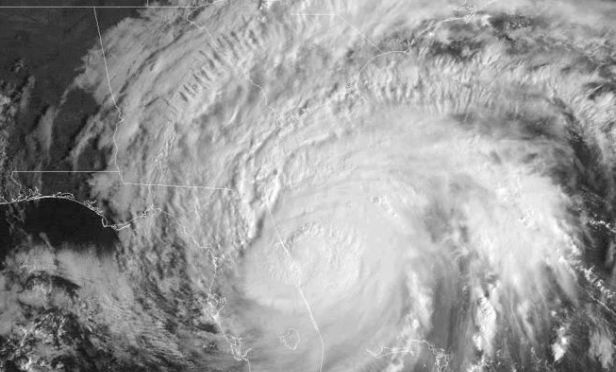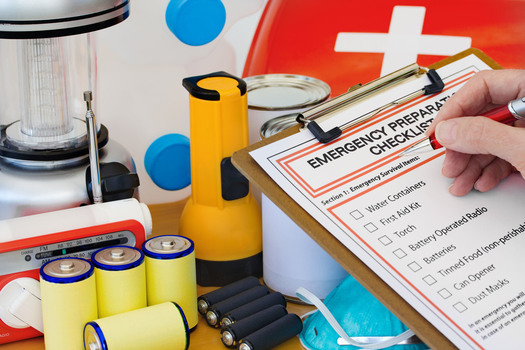 This imageprovided by NOAA. taken Oct. 7, 2016, shows Hurricane Matthew overthe Southeastern part of the U.S. A new study finds wind and watershifts during busy hurricane seasons seem to provide a somewhatprotective barrier for the U.S. coast. Hurricane Matthew was amajor storm and hit Haiti with 145 mph winds, but fizzled as itneared the Americas. (NOAA via AP)
This imageprovided by NOAA. taken Oct. 7, 2016, shows Hurricane Matthew overthe Southeastern part of the U.S. A new study finds wind and watershifts during busy hurricane seasons seem to provide a somewhatprotective barrier for the U.S. coast. Hurricane Matthew was amajor storm and hit Haiti with 145 mph winds, but fizzled as itneared the Americas. (NOAA via AP)
Hurricanes can cause widespread devastation injust a few hours.
|Extreme winds, harsh rainfall, floods, storm surges and eventornadoes can work together to create one of the most destructivescenes a community may ever see.
|Despite predictions for a less severe hurricaneseason this year, as Hurricane Matthew proved last fall, it onlytakes one storm to reach land to create major havoc for home andbusiness owners in any part of the country.
|To keep safe during hurricanes and other natural disasters, it'scrucial to prepare well before the storm arrives. Here is arefresher on steps to take to keep your home or business safe froma hurricane this season.
|Related: Hurricane Matthew breaks records, Aon reportshows
||
(Photo: Shutterstock)
|1. Make an emergency kit.
Emergency kits typically include essentials like water,non-perishable food, first-aid kits, medications, flashlights,batteries, a crank radio, important documents, and anything elseyou might need if you have to evacuate quickly. Onceassembled, keep your emergency kit stocked in a secure location youcan access quickly if you need to evacuate.
|Related: How to prepare your pets for a naturaldisaster
||
(Photo: Shutterstock)
|2. Create a communication plan.
Sit down with your family to establish a buddy system, how youwill get in touch with each other if you aren't together whendisaster strikes, and the safe area where you will meet ifseparated.
|Related: Personal emergency preparedness: Are your clientsreally ready?
||
(Photo: Shutterstock)
|3. Contact your community.
If hurricanes are common in your area, your local emergencymanagement system may already have evacuation routes andpredetermined storm shelters in place. If so, locate these routesbefore a storm even begins.
|Related: 6 tips for staying connected this severe weather& hurricane season
||
(Photo: Shutterstock)
|4. Stay informed.
Listen to local weather services on TV, radio or social media toget the latest updates about storms in your area. Authorities willuse these devices to let you know when it's time to evacuate andtake action.
|Related: 6 keys to successfully weathering thestorm
||
(Photo: Shutterstock)
|5. Practice your plan.
Get your family or employees together to put your plan intoaction. Simulate the effects of a storm as much as possible. If younotice any holes or areas that need fixing, now is the time to maketweaks — before the storm actually hits.
|Related: 8 ways to prepare your insureds for adisaster
||
(Photo: Shutterstock)
|Protecting your house from a hurricane.
While it's crucial that you take steps to keep yourself and yourfamily safe from hurricanes, it's important that your home isprotected, too. To properly prepare your home for a disaster,consider the following:
|1. Get reinforcements.
Your doors, windows, walls and roof are extremely vulnerableduring hurricanes. Have a professional inspect your home todetermine the proper way to reinforce these crucial areas before astorm hits.
|Related: 4 tips to protect property from hurricanes[infographic]
||
(Photo: Shutterstock)
|2. Remove outdoor items.
Removing items in your yard like furniture, umbrellas, debris,loose rain gutters, dead trees and more can decrease the risk ofitems getting picked up and thrown into your home during the storm.If you suspect a storm is moving in, secure or remove as manyoutdoor items as possible.
|Related: Backyard danger! Swings, slides & other playthings pose risk, safety concerns
||
(Photo: Shutterstock)
|3. Waterproof your basement.
It's likely that you'll experience flooding during thehurricane. To minimize costs and damages, have a professionalinspect and waterproof your basement as much as possible. Be sureto elevate all critical utilities to decrease the risk ofelectrical shock and store any books or critical papers in plasticbins or on upper levels of the house.
|Related: Are your customers prepared to weather the pitfallsof hurricane season?
||
(Photo: Shutterstock)
|4. Purchase flood insurance.
Most homeowners' insurance plans don't cover any risksassociated with floods, making owners potentially liable for anyrepairs required after the hurricane. Flood insurance must be purchased well beforethe storm hits and covers the structure, but not the contentsinside. Make sure to review the policy to determine what isspecifically covered.
|Following these steps will help mitigate some of the damage toyour home and expedite recovery and restoration efforts.
|Related: Hurricane deductibles: How much do homeownersknow?
|Pete Duncanson is director of businessprocess and branch operations for ServiceMaster Restore, and chairman ofthe board for the IICRC. He can be reached at [email protected].
Want to continue reading?
Become a Free PropertyCasualty360 Digital Reader
Your access to unlimited PropertyCasualty360 content isn’t changing.
Once you are an ALM digital member, you’ll receive:
- All PropertyCasualty360.com news coverage, best practices, and in-depth analysis.
- Educational webcasts, resources from industry leaders, and informative newsletters.
- Other award-winning websites including BenefitsPRO.com and ThinkAdvisor.com.
Already have an account? Sign In
© 2024 ALM Global, LLC, All Rights Reserved. Request academic re-use from www.copyright.com. All other uses, submit a request to [email protected]. For more information visit Asset & Logo Licensing.








